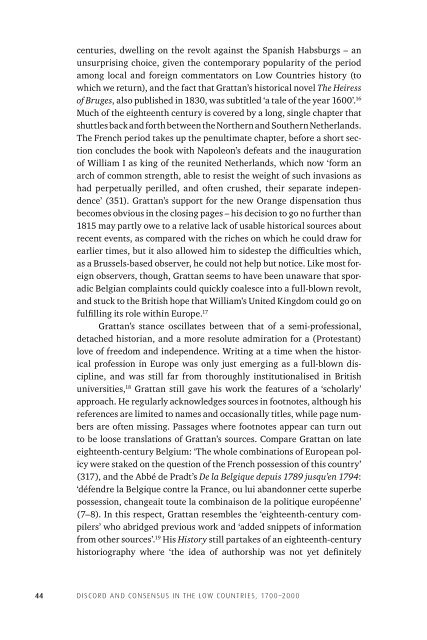Discord Consensus
7aze300jFJo
7aze300jFJo
Create successful ePaper yourself
Turn your PDF publications into a flip-book with our unique Google optimized e-Paper software.
centuries, dwelling on the revolt against the Spanish Habsburgs –an<br />
unsurprising choice, given the contemporary popularity of the period<br />
among local and foreign commentators on Low Countries history (to<br />
which we return), and the fact that Grattan’s historical novel The Heiress<br />
of Bruges, also published in 1830, was subtitled ‘a tale of the year 1600’. 16<br />
Much of the eighteenth century is covered by a long, single chapter that<br />
shuttles back and forth between the Northern and Southern Netherlands.<br />
The French period takes up the penultimate chapter, before a short section<br />
concludes the book with Napoleon’s defeats and the inauguration<br />
of William I as king of the reunited Netherlands, which now ‘form an<br />
arch of common strength, able to resist the weight of such invasions as<br />
had perpetually perilled, and often crushed, their separate independence’<br />
(351). Grattan’s support for the new Orange dispensation thus<br />
becomes obvious in the closing pages –his decision to go no further than<br />
1815 may partly owe to a relative lack of usable historical sources about<br />
recent events, as compared with the riches on which he could draw for<br />
earlier times, but it also allowed him to sidestep the difficulties which,<br />
as a Brussels-based observer, he could not help but notice. Like most foreign<br />
observers, though, Grattan seems to have been unaware that sporadic<br />
Belgian complaints could quickly coalesce into a full-blown revolt,<br />
and stuck to the British hope that William’s United Kingdom could go on<br />
fulfilling its role within Europe. 17<br />
Grattan’s stance oscillates between that of a semi-professional,<br />
detached historian, and a more resolute admiration for a (Protestant)<br />
love of freedom and independence. Writing at a time when the historical<br />
profession in Europe was only just emerging as a full-blown discipline,<br />
and was still far from thoroughly institutionalised in British<br />
universities, 18 Grattan still gave his work the features of a ‘scholarly’<br />
approach. He regularly acknowledges sources in footnotes, although his<br />
references are limited to names and occasionally titles, while page numbers<br />
are often missing. Passages where footnotes appear can turn out<br />
to be loose translations of Grattan’s sources. Compare Grattan on late<br />
eighteenth-century Belgium: ‘The whole combinations of European policy<br />
were staked on the question of the French possession of this country’<br />
(317), and the Abbé de Pradt’s De la Belgique depuis 1789 jusqu’en 1794:<br />
‘défendre la Belgique contre la France, ou lui abandonner cette superbe<br />
possession, changeait toute la combinaison de la politique européenne’<br />
(7–8). In this respect, Grattan resembles the ‘eighteenth-century compilers’<br />
who abridged previous work and ‘added snippets of information<br />
from other sources’. 19 His History still partakes of an eighteenth-century<br />
historiography where ‘the idea of authorship was not yet definitely<br />
44<br />
DISCORD AND CONSENSUS IN THE LOW COUNTRIES, 1700–2000


